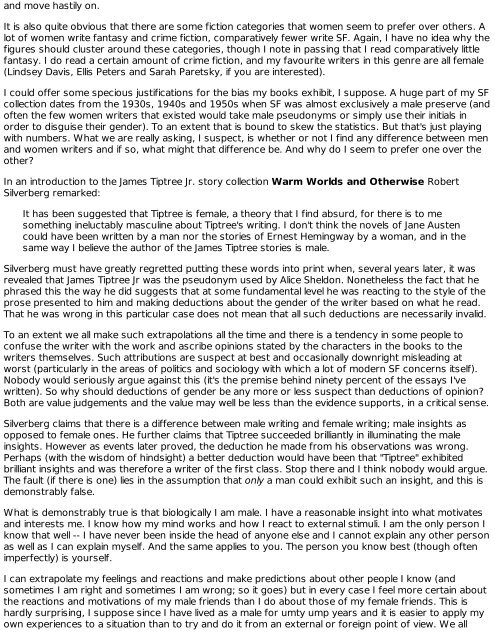Triffids Beard 2 - The Bearded Triffid
Triffids Beard 2 - The Bearded Triffid
Triffids Beard 2 - The Bearded Triffid
You also want an ePaper? Increase the reach of your titles
YUMPU automatically turns print PDFs into web optimized ePapers that Google loves.
and move hastily on.<br />
It is also quite obvious that there are some fiction categories that women seem to prefer over others. A<br />
lot of women write fantasy and crime fiction, comparatively fewer write SF. Again, I have no idea why the<br />
figures should cluster around these categories, though I note in passing that I read comparatively little<br />
fantasy. I do read a certain amount of crime fiction, and my favourite writers in this genre are all female<br />
(Lindsey Davis, Ellis Peters and Sarah Paretsky, if you are interested).<br />
I could offer some specious justifications for the bias my books exhibit, I suppose. A huge part of my SF<br />
collection dates from the 1930s, 1940s and 1950s when SF was almost exclusively a male preserve (and<br />
often the few women writers that existed would take male pseudonyms or simply use their initials in<br />
order to disguise their gender). To an extent that is bound to skew the statistics. But that's just playing<br />
with numbers. What we are really asking, I suspect, is whether or not I find any difference between men<br />
and women writers and if so, what might that difference be. And why do I seem to prefer one over the<br />
other?<br />
In an introduction to the James Tiptree Jr. story collection Warm Worlds and Otherwise Robert<br />
Silverberg remarked:<br />
It has been suggested that Tiptree is female, a theory that I find absurd, for there is to me<br />
something ineluctably masculine about Tiptree's writing. I don't think the novels of Jane Austen<br />
could have been written by a man nor the stories of Ernest Hemingway by a woman, and in the<br />
same way I believe the author of the James Tiptree stories is male.<br />
Silverberg must have greatly regretted putting these words into print when, several years later, it was<br />
revealed that James Tiptree Jr was the pseudonym used by Alice Sheldon. Nonetheless the fact that he<br />
phrased this the way he did suggests that at some fundamental level he was reacting to the style of the<br />
prose presented to him and making deductions about the gender of the writer based on what he read.<br />
That he was wrong in this particular case does not mean that all such deductions are necessarily invalid.<br />
To an extent we all make such extrapolations all the time and there is a tendency in some people to<br />
confuse the writer with the work and ascribe opinions stated by the characters in the books to the<br />
writers themselves. Such attributions are suspect at best and occasionally downright misleading at<br />
worst (particularly in the areas of politics and sociology with which a lot of modern SF concerns itself).<br />
Nobody would seriously argue against this (it's the premise behind ninety percent of the essays I've<br />
written). So why should deductions of gender be any more or less suspect than deductions of opinion?<br />
Both are value judgements and the value may well be less than the evidence supports, in a critical sense.<br />
Silverberg claims that there is a difference between male writing and female writing; male insights as<br />
opposed to female ones. He further claims that Tiptree succeeded brilliantly in illuminating the male<br />
insights. However as events later proved, the deduction he made from his observations was wrong.<br />
Perhaps (with the wisdom of hindsight) a better deduction would have been that "Tiptree" exhibited<br />
brilliant insights and was therefore a writer of the first class. Stop there and I think nobody would argue.<br />
<strong>The</strong> fault (if there is one) lies in the assumption that only a man could exhibit such an insight, and this is<br />
demonstrably false.<br />
What is demonstrably true is that biologically I am male. I have a reasonable insight into what motivates<br />
and interests me. I know how my mind works and how I react to external stimuli. I am the only person I<br />
know that well -- I have never been inside the head of anyone else and I cannot explain any other person<br />
as well as I can explain myself. And the same applies to you. <strong>The</strong> person you know best (though often<br />
imperfectly) is yourself.<br />
I can extrapolate my feelings and reactions and make predictions about other people I know (and<br />
sometimes I am right and sometimes I am wrong; so it goes) but in every case I feel more certain about<br />
the reactions and motivations of my male friends than I do about those of my female friends. This is<br />
hardly surprising, I suppose since I have lived as a male for umty ump years and it is easier to apply my<br />
own experiences to a situation than to try and do it from an external or foreign point of view. We all


